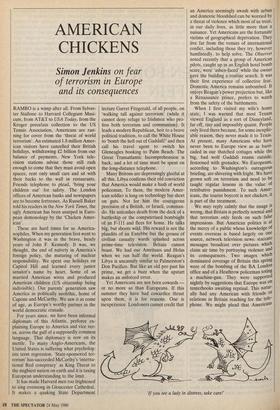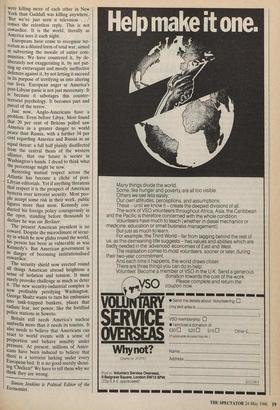AMERICAN CHICKENS
Simon Jenkins on fear
of terrorism in Europe and its consequences
RAMBO is a wimp after all. From Sylves- ter Stallone to Harvard Collegium Musi- cum , from AT&T to USA Today, from the Kroger porcelain collection to the US Tennis Association, Americans are run- ning for cover from the 'threat of world terrorism'. An estimated 1.8 million Amer- ican visitors have cancelled their British holidays, withdrawing £2 billion from our balance of payments. New York tele- vision stations advise those still rash enough to come that they must avoid open spaces, rent only small cars and sit with their backs to the wall in restaurants. Friends telephone to plead, 'bring your children out' for safety. The London offices of American banks and newspapers are to become fortresses. As Russell Baker told his readers in the New York Times, the ugly American has been usurped in Euro- pean demonology by the 'Chicken Amer- ican'.
These are hard times for us America- nophiles. When my generation first went to Washington it was in the brave, heady years of John F. Kennedy. It was, we thought, the end of naivety in America's foreign policy, the maturing of nuclear responsibility. We spent our holidays on Capitol Hill and learned every junior senator's name by heart. Some of us married American wives and produced American children (US citizenship being indivisible). Our parents' generation saw America as politically neolithic, home of Capone and McCarthy. We saw it as come of age, as Europe's worthy partner in the world democratic crusade.
For years since, we have been informal diplomats of this Atlantis, perforce ex- plaining Europe to America and vice ver- sa, across the gulf of a supposedly common language. That diplomacy is now on its mettle. To many Anglo-Americans, the United States is suffering what psycholog- ists term regression. 'State-sponsored ter- rorism' has succeeded McCarthy's 'interna- tional Red conspiracy' as King Threat to the mighiest nation on earth and it is taxing European understanding to the limit.
It has made Harvard men too frightened to sing evensong in Gloucester Cathedral. It makes a quaking State Department lecture Garret Fitzgerald, of all people, on `walking tall against terrorism' (while it cannot deny refuge to Irishmen who pro- fess both terrorism and communism). It leads a modern Republican, heir to a brave political tradition, to call the White House to 'bomb the hell out of Gaddafi!' and then call his travel agent to switch his Gleneagles booking to Palm Beach. The Great Transatlantic Incomprehension is back, and a lot of time must be spent on the long-distance telephone.
Many Britons are depressingly gleeful at all this. Libya confirms their old conviction that America would make a hash of world policeman. To them, the modern Amer- ican soldier is long on technology but short on guts. Not for him the courageous precision of a British, or Israeli, comman- do. He unleashes death from the deck of a battleship or the computerised bombsight of an F-111 and flees for home. He talks big, but shoots wild. His reward is not the plaudits of an Entebbe but the groans of civilian casualty wards splashed across prime-time television. Britain cannot boast. We had our Amritsars and Holas when we ran half the world. Reagan's Libya is uncannily similar to Palmerston's Don Pacifico. But like an old pro past his prime, we get a buzz when the upstart makes an unforced error.
Yet Americans are not born cowards or no more so than Europeans. If this summer they have had cowardice thrust upon them, it is for reasons. One is inexperience. Londoners cannot credit that an America seemingly awash with urban and domestic bloodshed can be worried by a threat of violence which most of us treat, in our daily lives, as little more than a nuisance. Yet Americans are the fortunate victims of geographical deprivation. They live far from the venues of international confict, including those they try, however hamfistedly, to help solve. The Observer noted recently that a group of American pilots, caught up in an English hotel bomb scare, were 'ashen-faced' while the owner gave the building a routine search. It was their first experience of collective fear. Domestic America remains unbombed. It enjoys Reagan's power projection but, like a Renaissance prince, prefers to watch from the safety of the battlements.
When I first visited my wife's home state, I was warned that most Texans viewed England as a sort of Disneyland, far off, tiny and impossibly quaint. People only lived there because, for some inexplic- able reason, they never made it to Texas. At present, many Americans who have never been to Europe view us as barri- caded in our thatched cottages while the big, bad wolf Gaddafi roams outside, festooned with grenades. We Europeans, according to Washington's outrageous briefing, are shivering with fright. We have grown soft on terrorism and need to be taught regular lessons in the value of retributive punishment. To such Amer- icans, the tourist boycott is not chicken, it is part of the treatment. We may reply calmly that the image is wrong, that Britain is perfectly normal and that terrorism only feeds on such false impressions. But American politics is at the mercy of a public whose knowledge of events overseas is based largely on one source, network television news: staccato messages broadcast over pictures which claim air time by portraying violence and its consequences. Two images which dominated coverage of Britain this spring were of the bombing of the BA London office and of a Heathrow policeman toting a machine-gun. They were supported nightly by suggestions that Europe was on tenterhooks awaiting reprisal. This natur- ally had any American with friends or relations in Britain reaching for the tele- phone. We might plead that Americans If you see a lady in distress, take care!' were killing more of each other in New York than Gaddafi was killing anywhere. `But we've just seen n television . . comes the relentless reply. This is not cowardice. It is the world, literally as America sees it each night.
Europeans have come to recognise ter- rorism as a diluted form of total war, aimed at subverting the morale of entire com- munities. We have countered it, by de- liberately not exaggerating it, by not put- ting up extravagant and mostly ineffective defences against it, by not letting it succeed in its purpose of terrifying us into altering our lives. European anger at America's post-Libyan panic is not just mercenary. It is because it sabotages this counter- terrorist psychology. It becomes part and parcel of the terror.
Just now, Anglo-Americans have a problem. Even before Libya, Mori found that 20 per cent of Britons polled saw America as a greater danger to world peace than Russia, with a further 34 per cent regarding America and Russia as an equal threat: a full half plainly disaffected from the central thesis of the western alliance, that our future is secure in Washington's hands. I dread to think what the percentage might be now.
Restoring mutual respect across the Atlantic has become a cliché of post- Libyan editorials. Yet if anything threatens that respect it is the prospect of American hysteria over terrorist security. Most peo- ple accept some risk in their work, public figures more than most. Kennedy con- ducted his foreign policy courageously in the open, standing before thousands to declare he was eM Berliner.
The present American president is no coward. Despite the microclimate of secur- ity in which he now glides round the world, his person has been as vulnerable as was Kennedy's. But American government is in danger of becoming institutionalised cowardice.
The security shield now erected round all things American abroad heightens a sense of isolation and tension. It must surely provoke challenge as much as deter it. The new security-industrial complex is now profitably petrifying Washington. George Shultz wants to turn his embassies into tank-trapped bunkers, places that radiate fear, not power, like the fortified police stations in Soweto.
Britain still needs America's nuclear umbrella more than it needs its tourists. It also needs to believe that Americans can react to world events with a sense of proportion and behave sensibly under pressure. At present, millions of Amer- icans have been induced to believe that there is a terrorist lurking under every European bed. It is no good merely shout- ing 'Chicken!' We have to tell them why we think they are wrong.
Simon Jenkins is Poltical Editor of the Economist.















































 Previous page
Previous page